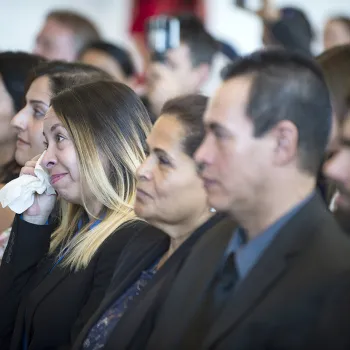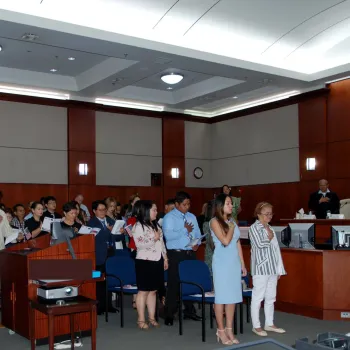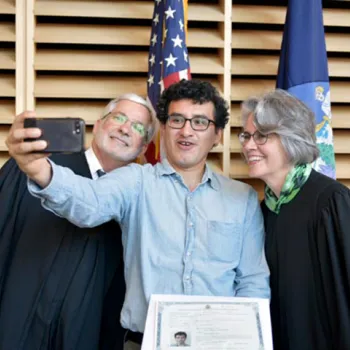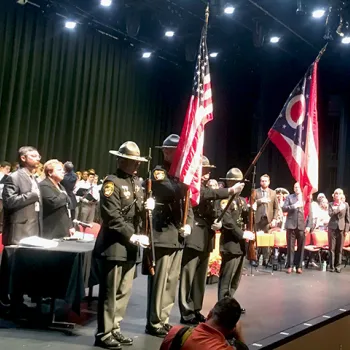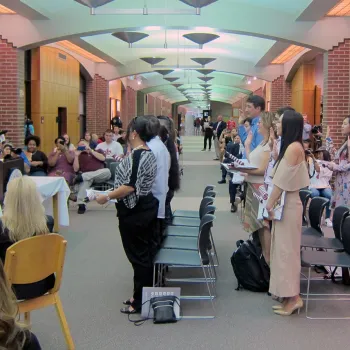Judges engaged the public in real-life civics lessons at Constitution Day celebrations on college campuses, at readings of the founding document on courthouse steps, during naturalization ceremonies at presidential homes, and in recitations of the preamble.
The events, scheduled across the country throughout September, mark the 231st anniversary of the signing of the Constitution, in Philadelphia on Sept. 17, 1787. The theme of the Judiciary’s 2018 national initiative is “Federal Courts: Guardians of the Constitution.”
“Few people take the time to ponder our Constitution as a living, breathing embodiment of the way we choose to govern ourselves in this country,” said U.S. Magistrate Judge Kathleen M. Tafoya, of the District of Colorado, who naturalized new citizens at the United States Air Force Academy in Colorado Springs. “A naturalization ceremony exemplifies our collective decision to grow and evolve as a nation.”
Working in partnership with the Civics Renewal Network, federal courts honor the Constitution at events to help promote civic awareness. According to an annual survey by the Annenberg Public Policy Center of the University of Pennsylvania, a Network partner, public knowledge about the three branches of government rose this year, after stagnating at low levels in recent years.
This year, 32 percent of Americans were able to correctly name all three branches of government, an increase from last year’s 26 percent and the highest since 2014, when it was 36 percent. The survey also found that people with greater knowledge of the Constitution are more likely to support the institutional role of the U.S. Supreme Court.
All told, Constitution Day events were conducted from Maine to Guam and the Northern Mariana islands.
In addition to conducting ceremonies in multiple federal courthouses, judges participated in:
- Naturalizations and Constitution Day celebrations on college campuses in events that were witnessed by students.
- Readings of the founding document on the steps of three courthouses in Tennessee.
- Naturalization ceremonies at four presidential homes or libraries: Sagamore Hill National Historic Site (Theodore Roosevelt), Oyster Bay, New York; James A. Garfield National Historic Site, Mentor, Ohio; Harry S. Truman Library, Independence, Mo.; and the Herbert Hoover Presidential Library and Museum, West Branch, Iowa.
- Students at a Boys and Girls Club down the street from the federal courthouse in Greenville, Mississippi, used cue cards prepared by court staff to recite the preamble together.
The following are highlights from the Judiciary’s 2018 celebration of Constitution Day and Citizenship Day:
United States Air Force Academy
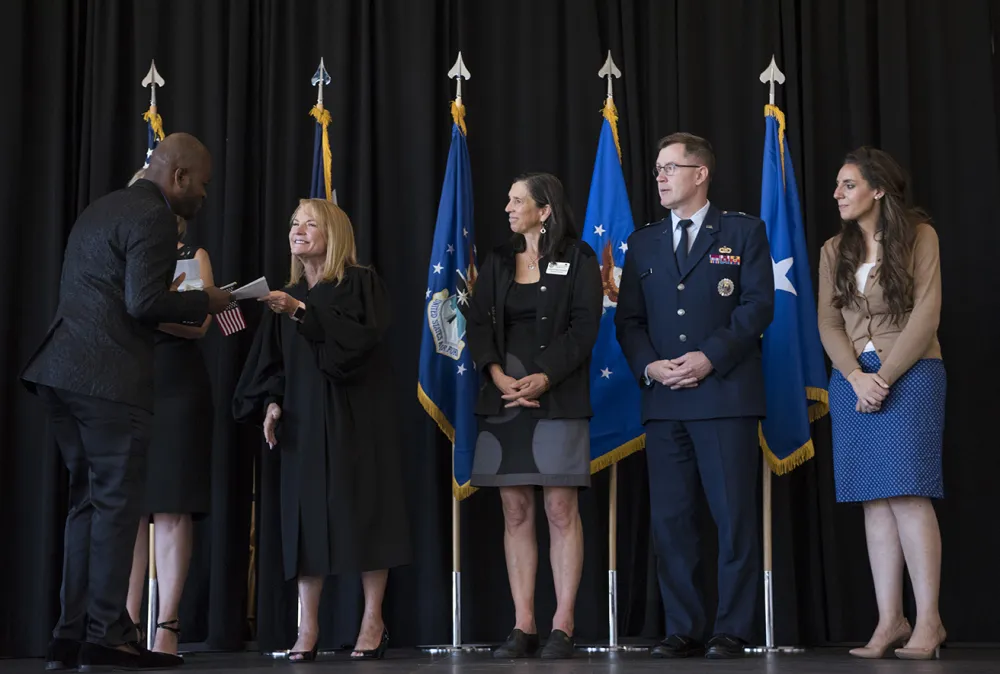
Nearly 50 people became Americans in front of friends, family and cadets at the U.S. Air Force Academy.
At the Air Force Academy–a combined university campus and military base–the commitments voiced by new citizens on Sept. 14 were familiar to cadets and officers who were observing the proceedings.
The Oath of Allegiance and the Oath of Military Enlistment both include similar language relating to the nation’s defense. New citizens pledge “that I will support and defend the Constitution and laws of the United States of America against all enemies, foreign and domestic; that I will bear true faith and allegiance to the same.”
The oath further requires new citizens to serve in combat and noncombat positions for the armed services, when required by law. The group recitation by 49 people born in 23 countries added another dimension of connection with the military personnel in the room.
“The Air Force Academy is an especially fitting venue for a naturalization ceremony,” said Judge Tafoya. “The setting reminds citizens that one of the duties incumbent on us all is the obligation to defend our chosen way of life when the need arises.”
Wayne State University
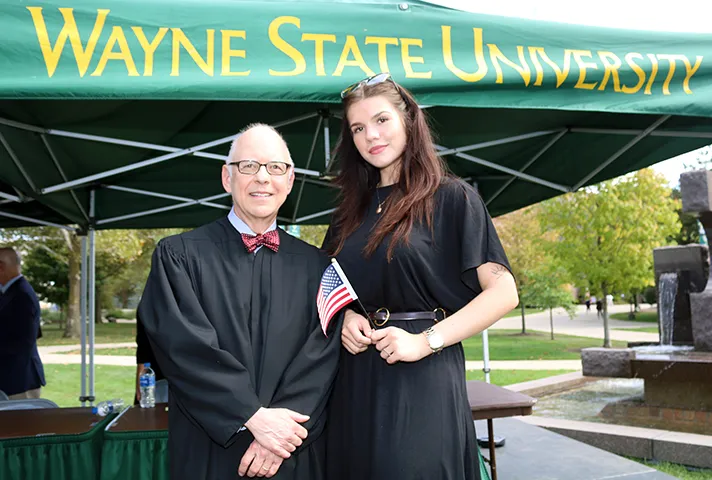
U.S. District Court Judge Mark A. Goldsmith with new citizen, Xenya Burdo.
Twenty-five immigrants from 15 nations were naturalized at a Sept. 17 ceremony on the Wayne State University campus in Detroit.
The oath of citizenship, administered by U.S. District Judge Mark A. Goldsmith during a special session of court, was conducted in the center of campus under sunny skies and 82-degree weather as students scurried between classes. The event was held in conjunction with Wayne’s fourth annual Constitution Day and Civic Festival.
One of the new citizens, Xenya Burdo, was a 21-year-old Wayne State sophomore who was born in the Russian Federation and grew up in Ukraine before immigrating to the United States in 2010. She said she came to the U.S. to join her father and to liberate herself from the stigma of being a Russian living in Ukraine.
Asked how she felt about becoming a U.S. citizen, Burdo said: “Oh, my goodness! A lot of Americans don’t really appreciate that they have so much freedom... to be who they are and what they want to become without being ashamed.”
Greeneville, Knoxville, and Chattanooga
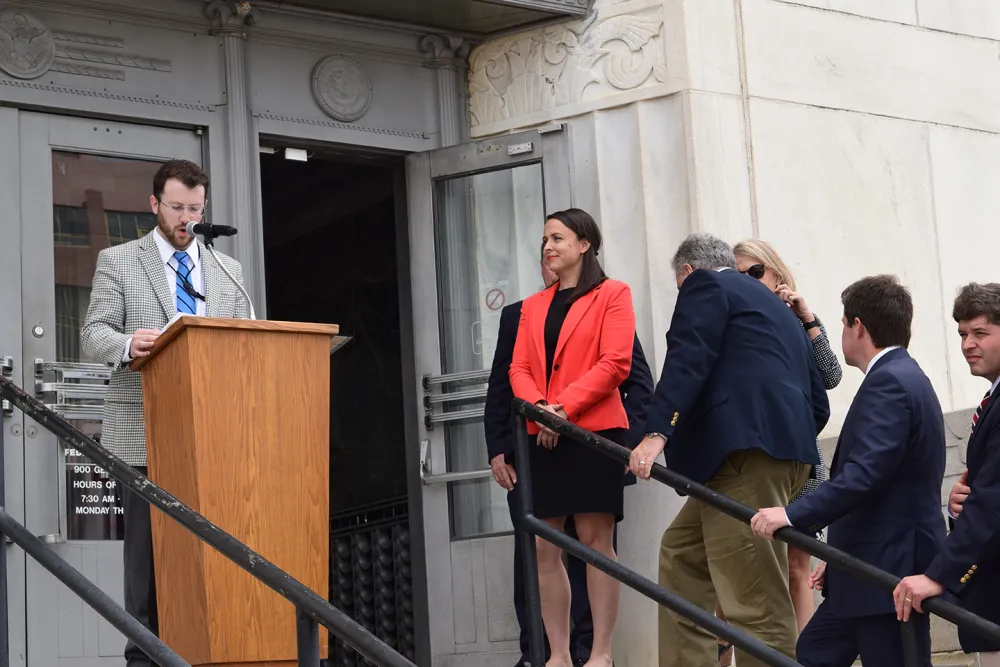
People take turns reading the Constitution on the steps of the Joel W. Solomon Federal Building and United States Courthouse in Chattanooga, Tenn. on Sept. 17.
The judges and court staff in the Eastern District of Tennessee made Constitution Day a community event by inviting volunteers to publicly read every word of the founding document at all three courthouses. In Greeneville, Knoxville, and Chattanooga, judges, lawyers, court staff, elected officials, veterans, Daughters of the American Revolution, students, volunteers of every stripe, and people walking by the courthouses read one-minute segments of the Constitution.
University of Toledo
More than 60 new citizens took their Oaths of Allegiance at a Sept. 17 naturalization. U.S. District Judge Jack Zouhary, of the Northern District of Ohio, presided.
Zouhary, who grew up in an immigrant family, began holding naturalizations in community settings after feeling disappointment when he administered the oath to new citizens in crowded courtrooms.
“Taking our naturalization ceremonies on the road has been a success for all involved, as we remind everyone that citizenship comes with a price and should never be taken for granted,” Zouhary said. “As for me, each time I stand at the podium and look out at the smiling faces of the new citizens and their families, they remind me of my own family and their struggles and sacrifices to become proud Americans.”
A brief video excerpt of the ceremony was produced by the University of Toledo.
Reciting the Preamble
Two federal courts worked with judges and staff to create video recitations of the Constitution’s 52-word preamble. The videos were produced by the Eastern District of Wisconsin and the Western District of Oklahoma.
In addition, the U.S. Courts have produced two preamble videos, one that shows students reflecting on the preamble’s meaning. The second video can be used to lead groups in reciting the preamble.
Additional Ceremonies
A Sept. 19 naturalization was held for about 70 new citizens at the University of New Hampshire (UNH) in Durham. The program, one of two naturalizations hosted by the District of New Hampshire, was to be witnessed by about 200 students, including 100 from the UNH Law School.
“Students who observe a naturalization ceremony witness a uniquely American celebration,” said U.S. District Judge Landya B. McCafferty, who presided at the ceremony on the university’s Durham campus.
“People who come here, often fleeing violence and oppression, freely take an oath to support and defend the Constitution and the laws of this country that citizens by birth may take for granted,” McCafferty said.
At Bradley University’s Renaissance Coliseum in Peoria, Illinois, about 700 new citizens will be naturalized on Sept. 25, with as many as 2,000 observers in attendance.
“A naturalization ceremony is a living civics lesson because it is the true-life story of grandparents, parents and these newly naturalized citizens all coming together with their own story, their own struggle, their own successes all assimilating here to continue to build our nation,” said Chief Judge James E. Shadid of the Central District of Illinois.
Shadid’s grandparents came “from a forgotten corner of Lebanon” and were naturalized 88 years ago. “If my grandfather were here today, he would tell me that no matter the law I’ve learned, or the books I’ve read, or the titles I have obtained, I already hold the highest office in the land—the office of citizen.”
Angelo State University in San Angelo, Texas, will host a naturalization ceremony on Sept. 26.
“The joy, pride, and sense of accomplishment that is evident in the eyes of each new citizen is hard to describe,” said U.S. Magistrate Judge E. Scott Frost, of the Northern District of Texas, who will preside. “Our universities are filled with great professors, but I challenge any lecture or textbook to deliver a visceral message that is so compelling.”
Subscribe to News Updates
Subscribe to be notified when the news section is updated.

